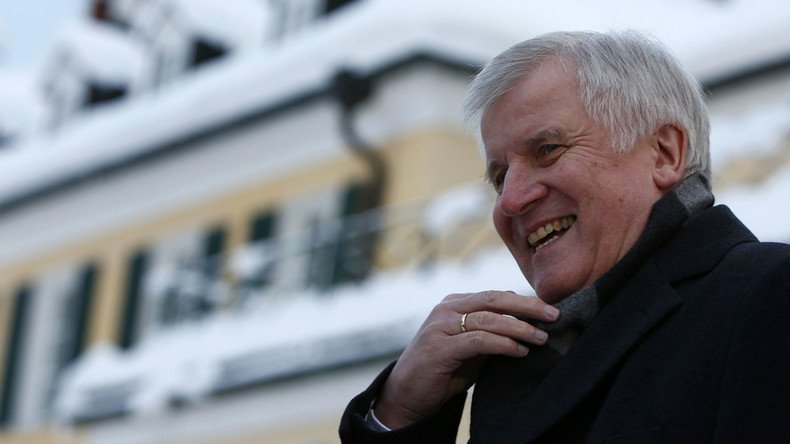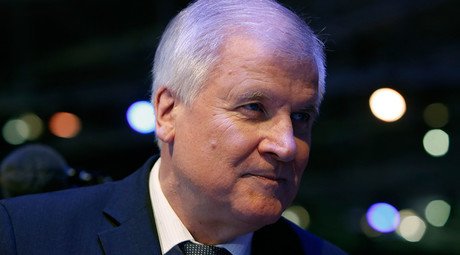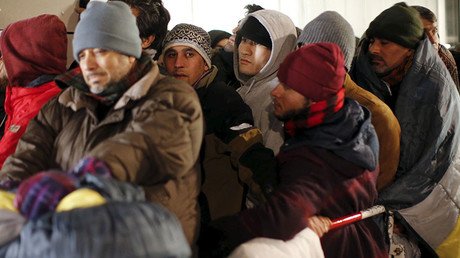Anti-sanction, Merkel-critic Bavarian leader to meet Putin in Moscow

The leader of the German state of Bavaria, Horst Seehofer, is set to travel to Moscow to visit Russian President Vladimir Putin. Seehofer, who is critical of German sanctions imposed on Russia, says he wants “good relations” with Moscow.
Seehofer defended his visit to the Russian capital scheduled for early February, saying it was not politically-motivated. He added that he would look to discuss economic proposals between Bavaria and Russia.
"We have prepared this trip very carefully ... and we are not pursuing any parallel foreign policy," Seehofer told ZDF television, as cited by Reuters.
Seehofer, the leader of the Christian Social Union (CSU), the Bavarian sister party to Chancellor Angela Merkel's Christian Democrats (CDU) has been critical of German imposed sanctions against Russia for Moscow’s perceived role in the Ukrainian conflict.
“Politically we have to face the fact that without Russia we cannot solve many things. We won't be able to solve them,” he said at the CSU’s party congress in Munich on November 21, after being re-elected as leader.
"Sanctions are doing enormous damage to the Bavarian economy and the national economy," he mentioned in January, speaking to the Bild am Sonntag.
However, not everyone is impressed with Seehofer’s decision to meet with Putin, a trip which he announced he would be undertaking months ago. Roderich Kiesewetter, a foreign policy spokesman for Merkel's conservatives in parliament said the CSU leader’s move could be interpreted as a direct challenge towards the German Chancellor.
"Seehofer has clearly positioned himself against the chancellor in the debate on refugees - I really hope he doesn't go on this trip," he told the Welt am Sonntag newspaper.
Meanwhile, Deputy Niels Annen from the Social Democrats, Merkel's junior coalition partner, told the same newspaper, as cited by Reuters that: "Foreign policy is made in Berlin, not in Munich," referring to the state capital of Bavaria.
Seehofer has been one of Chancellor Merkel’s staunchest critics regarding her open-door refugee and migrant policy, which saw an estimated 1.1 million asylum seekers travel to Germany in 2015. In January, the CSU sent Merkel a letter threatening to take the chancellor to the Constitutional Court if the federal government fails to secure the country’s borders and reduce the influx of asylum seekers.
The CSU proposed an action plan to deal with the refugee and migrant crisis in a press release. Its measures include establishing effective control over the EU’s external borders and border controls within the EU, ensuring a “fair distribution of migrants and refugees among the EU states,” introducing an annual limit of 200,000 asylum seekers that can be accepted by Germany, and deporting migrants back to the borders of neighboring states, primarily Austria.
“Bavaria needs effective measures immediately,” Bavarian Interior Minister Joachim Herrmann and Justice Minister Winfried Bausback said in a joint statement.
“If we fail to decrease the number of refugees coming to Germany every day, we must expect another million asylum seekers or more to come next year,” Herrmann added.
Bavaria has taken the brunt of the refugee influx, as the majority of new arrivals make their way into Germany through the southern border with Austria, and therefore arrive directly in the state.
In January, Peter Dreier, head of the Landshut district in Bavaria sent a bus with 30 refugees aboard on a 550km trip to Chancellor Merkel’s Berlin office – fulfilling a threat made in October, when he said he would act if the number of refugees exceeded housing capacity in his area.
Dreier had a heated conversation with the German Chancellor in October regarding the issue of asylum seekers, according to Die Welt.
“We can’t do it [taking in all the refugees]!” he said, deliberately inverting Merkel’s famous ‘We can do it’ slogan, which the chancellor used in the summer 2015 in reference to the high number of refugees Germany was taking.
“If Germany takes in a million refugees, that means my district will take in a share of 1,800. I will take them. But any more [refugees] I’ll send by bus to your office in Berlin,” Dreier warned.














